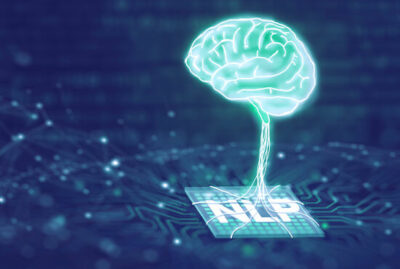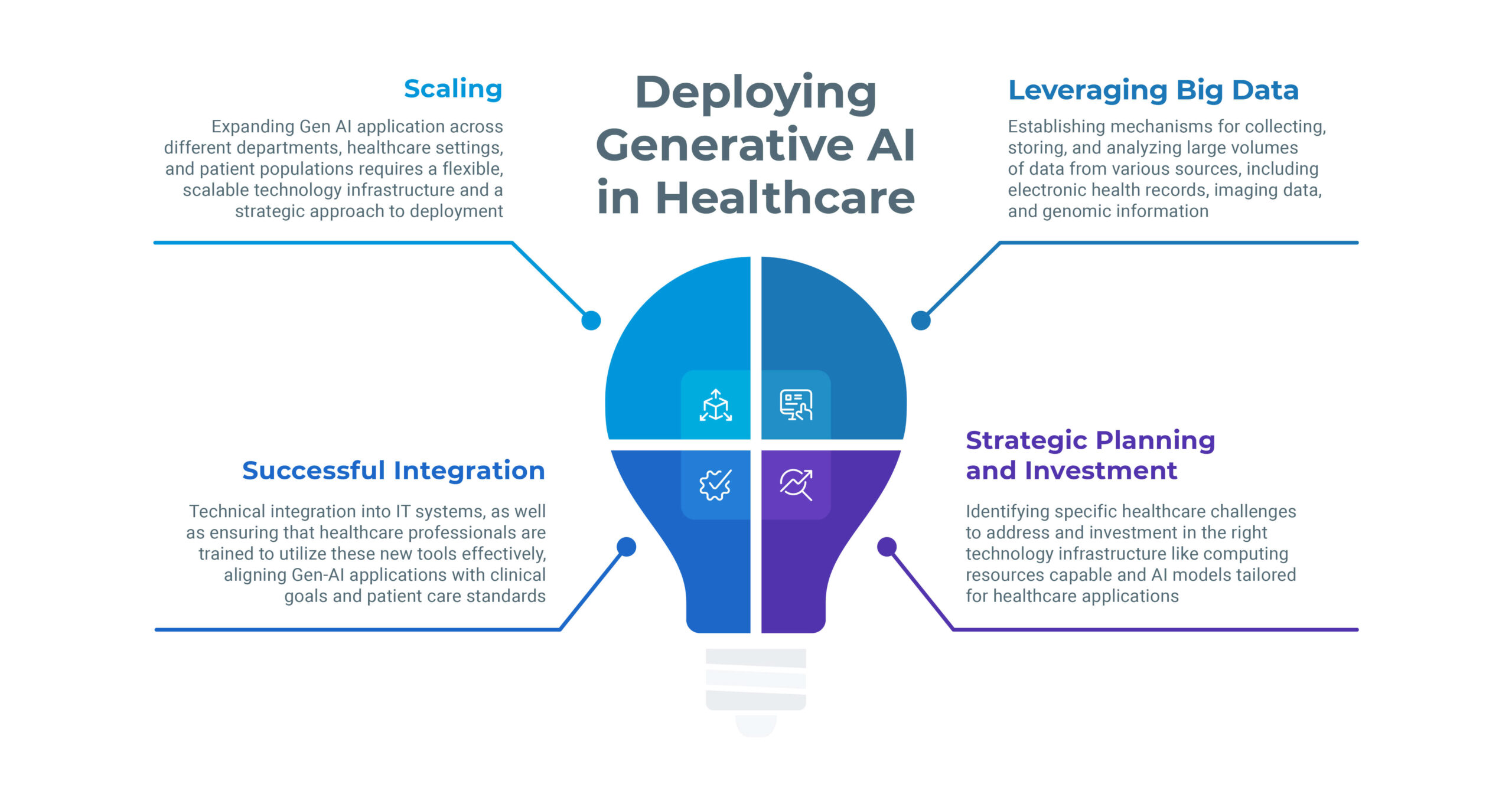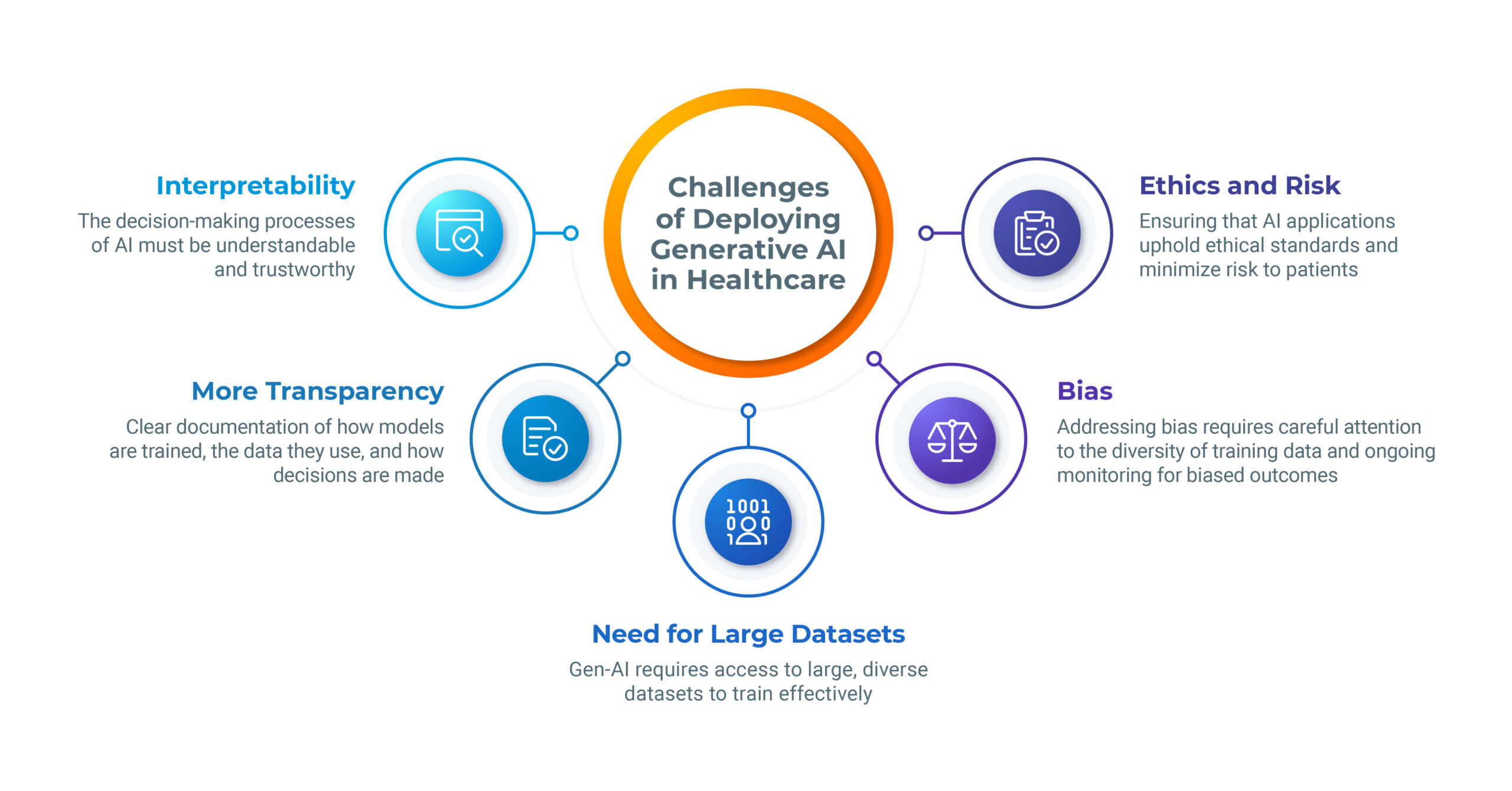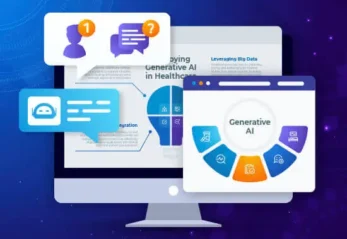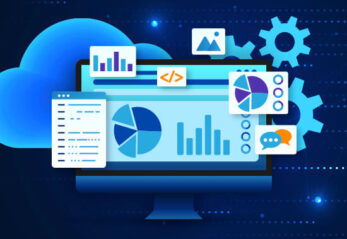Generative AI in healthcare is a transformative technology that utilizes advanced algorithms to synthesize and analyze medical data, facilitating personalized and efficient patient care.
Generative AI has shown its effectiveness in various areas of practice in the healthcare sector by making what used to be a time-consuming process to do manually. For instance, according to McKinsey, GenAI is capable of summarizing large amounts of data from patient histories, thus freeing up healthcare professionals to focus on more complex patient needs. Furthermore, Gen AI could revolutionize prior authorization and claims processing of health insurance, converting unstructured data into structured formats and providing near-real-time benefits verification.
In addition, Gen AI could change the way prior authorization and claims processing for health insurance is done, structure unstructured data, and provide real-time benefits verification. Also, Generative AI helps create better health assistants and very specific health plans. Therefore, the main functions of Generative AI in the healthcare setting are to respond to the patient’s queries, schedule doctor’s appointments, monitor symptoms of various diseases, and help the patient adhere to the medication schedule. Hence, this real-time support increases the interaction and leads to better results.
The third one is specialized care for practicing physicians and interns. The technology is also useful in planning and simulation, as it provides surgeons with 3D models to practice and plan before using them in the real world.
The use of AI in healthcare is not without its challenges. Ethical issues, data security risks, and the need for guidelines are some of the issues that have been raised. When handling health information, it is important to ensure that the results given by AI are accurate, reliable, and fair.
However, there are still prospects for the development of AI in healthcare. The improvements are still ongoing and still influence the provision of patient care, the conduct of research, and the healthcare sector in general. Thus, with the further development of AI technologies, new opportunities will be opened, which will change the possibilities in the field of medicine and healthcare.
What are the Trends of Generative AI in Healthcare in 2025
As we move into 2025, generative AI in healthcare in 2025 is set to redefine patient care, medical research, and operational efficiencies. Compared to 2024, where early adoption focused on pilot projects and regulatory discussions, 2025 will witness widespread implementation, more robust compliance frameworks, and advanced integration with multimodal AI models.
Key Generative AI Trends in Healthcare in 2025:
- Greater Adoption of Multimodal AI Models
In 2024, most healthcare generative AI applications relied on single-modality models, primarily text-based large language models (LLMs). However, generative AI trends 2025 indicate a shift toward multimodal models capable of analyzing and generating text, images, genomics data, and even real-time patient vitals simultaneously. This advancement will significantly improve diagnostics, clinical decision support, and medical imaging analysis. - Enhanced Regulation and Ethical AI Governance
While 2024 saw the introduction of AI regulations, 2025 will focus on refining these frameworks to ensure transparency, bias mitigation, and data security. Generative AI in 2025 will require compliance with stricter policies, especially in clinical trials and drug development, where synthetic data generation will play a pivotal role. - Expansion of Generative AI for Synthetic Data Generation in Healthcare
With increasing concerns about patient privacy, generative AI for synthetic data generation in healthcare will become a critical tool for research and AI model training. This approach will allow researchers to create realistic yet anonymous datasets, accelerating the development of new treatments without compromising patient confidentiality. - Personalized and AI-Powered Drug Discovery
In 2024, AI-assisted drug discovery showed promise, but generative AI medicine in 2025 will take it a step further by designing novel drug compounds in real time. AI-driven protein structure predictions and molecule generation will shorten the drug development lifecycle and improve treatment outcomes for complex diseases. - AI-Augmented Precision Medicine & Diagnostics
The next phase of gen AI use cases in healthcare will be its ability to tailor treatment plans with unprecedented accuracy. AI models will analyze genetic, lifestyle, and environmental factors to provide hyper-personalized treatment recommendations, making precision medicine more effective than ever.
The evolution of generative AI in healthcare in 2025 will bring major breakthroughs in personalized medicine, synthetic data generation, and AI-driven diagnostics. Compared to 2024, when many innovations were in experimental phases, 2025 will mark the transition to full-scale adoption, with stricter regulations ensuring ethical AI deployment. As healthcare generative AI continues to evolve, its potential to revolutionize patient care, drug development, and medical research will be greater than ever.
What are the Key Generative AI Use Cases in Healthcare
Generative AI is becoming more and more applied in the healthcare sector and exhibits a high level of competency in processing medical information. A talk on this subject, presented by John Snow Labs, delves into the practical applications and lessons learned from applying Generative AI models in healthcare settings.
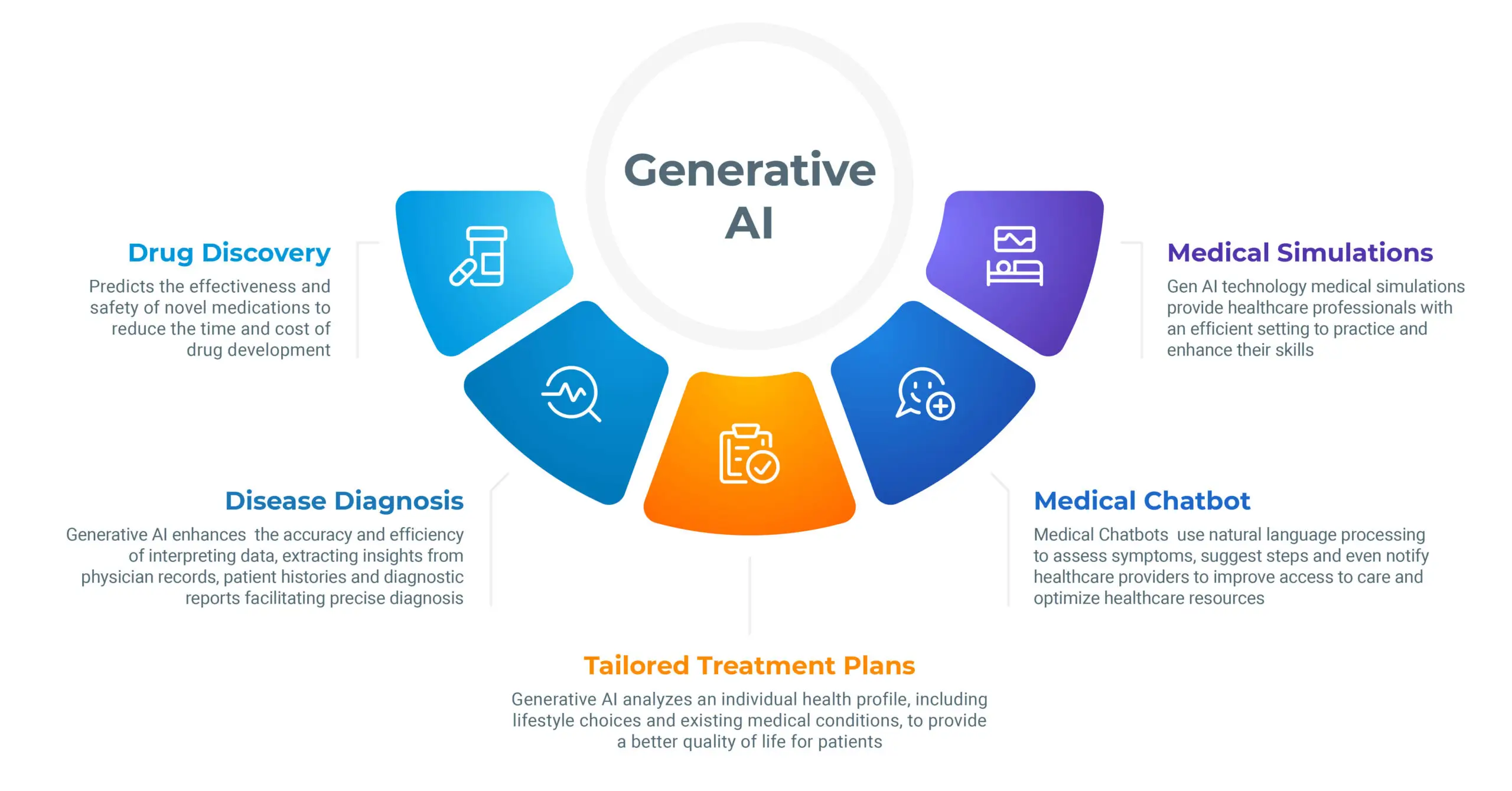
The talk emphasizes how Generative AI has achieved remarkable feats such as passing the US medical licensing exam and effectively summarizing clinical notes, demonstrating its advanced understanding of complex medical concepts and terminology. It also addresses the various challenges that come with these AI models. Issues such as robustness levels, privacy concerns, model biases, and “hallucinations” (the generation of incorrect or inappropriate information by Artificial Intelligence) are serious barriers to safe and effective implementation in healthcare.
John Snow Labs shares insights from deployed software, highlighting what has been learned through real-world applications and providing best practices for the healthcare AI community. The session also discusses the use cases for Generative AI that are currently being deployed, the architecture used to deliver these solutions, and benchmarks that are being developed to evaluate and decide between general-purpose and healthcare-specific GPT (Generative Pre-trained Transformer) models.
These findings are beneficial for firms planning to implement Generative AI in their healthcare services because they offer a real-life view of the opportunities and risks of these technologies. By leveraging the experiences of John Snow Labs and others in the field, healthcare providers can navigate the complexities of Generative AI with greater confidence and ethical consideration.
For a detailed overview of the talk and more insights into the practical applications of Generative AI in healthcare, you can watch the full session “Lessons Learned Applying Generative AI Models in Healthcare“.
The emergence of Gen AI technology in healthcare has brought forth opportunities to improve patient outcomes, streamline operations, and drive innovation throughout the healthcare system. The practice shows that Generative AI in medicine is applicable at all stages, from discovering drugs to creating treatment plans.
Drug Discovery
In drug discovery, Gen AI expedites the identification of compounds by simulating their interactions with biological targets. These AI systems use learning algorithms to determine the safety and efficacy of new drugs, which could significantly reduce the time and costs of the conventional drug development process. This not only speeds up the delivery of treatments but also helps investigate treatments for diseases that were previously unamenable to treatment because of their rarity or complexity.
Disease Diagnosis
Generative AI enhances disease diagnosis by enhancing the accuracy and efficiency of interpreting data. Healthcare NLP (Natural Language Processing) technologies extract insights from physician records, patient histories and diagnostic reports facilitating precise diagnosis. For conditions like cancer, diabetes and heart diseases early detection can be life saving.
How to Use Generative AI In Medical Chatbots
Medical chatbots powered by Gen AI are revolutionizing engagement and support.
Virtual assistants are available around the clock to provide communication services offering advice answering questions and guiding patients through their healthcare journey. These chatbots use natural language processing to assess symptoms, suggest steps and even notify healthcare providers in some cases. This improves access to care and optimizes healthcare resources.
When it comes to patient care, Generative AI technologies personalize the delivery of healthcare by tailoring treatments and monitoring plans according to patient needs. These AI systems analyze amounts of data including genomics, lifestyle factors and ongoing health information to create customized care plans. Applying AI in the treatment process also improves the quality of patient service. It improves patient compliance with treatment regimens and reduces medical errors.
Moreover, virtual assistants and robot therapists enhance accessibility and convenience for patients and healthcare professionals. Studies show that patients are more willing to engage with robotic therapists, especially for sensitive issues such as substance abuse or mental health concerns.
The imaging field is also evolving with the help of AI technology that can produce high-quality synthetic images for training and diagnosis. This technology creates realistic images with partial or incomplete information. It helps identify diseases that are difficult to detect through imaging procedures. In addition, Generative AI can protect patients’ privacy by blurring out identifiable information, thus enabling the sharing of medical images for educational and research purposes.
Tailored Treatment Plans
By analyzing an individuals health profile, including data like lifestyle choices and existing medical conditions generative AI creates customized treatment plans. This personalized approach ensures that treatments are more effective with side effects resulting in health outcomes and a better quality of life for patients.
What are the applications of Medical Simulations with GenAI
Gen AI technology-based medical simulations are an effective way to improve and develop the skills of healthcare professionals. These simulations can mimic procedures or low-frequency clinical scenarios, which are very useful in gaining practical experience without putting real patients at risk. This leads to better patient care and faster learning for the medical professionals.
As Generative AI continues to advance its integration into healthcare, it holds the potential to revolutionize the industry further. Hospitals, physician groups and health insurance companies are increasingly recognizing how GenAI can boost efficiency enhance outcomes and reduce healthcare costs.
How Enterprises Can Deploy Generative AI in Healthcare
The deployment of Generative AI for Healthcare by enterprises involves strategic planning, investment in technology, focus on successful integration and scaling:
- Strategic Planning and Investment: Enterprises must begin with a clear strategic plan that outlines the objectives for incorporating Gen-AI into their operations. This includes identifying specific healthcare challenges to address, such as improving diagnosis accuracy, personalizing patient care, or streamlining drug discovery. Investment in the right technology infrastructure is crucial, including computing resources capable of processing big data, and securing access to AI models and tools that are tailored for healthcare applications.
- Successful Integration: For Gen AI to effectively enhance healthcare services, it must be seamlessly integrated into existing healthcare systems and workflows. This involves technical integration into IT systems, as well as ensuring that healthcare professionals are trained to utilize these new tools effectively. Successful integration also means aligning Gen-AI applications with clinical goals and patient care standards to ensure they add value without disrupting care delivery.
- Leveraging Big Data: The power of Gen AI in healthcare largely comes from its ability to analyze and generate insights from big data. Enterprises must establish mechanisms for collecting, storing, and analyzing large volumes of data from various sources, including electronic health records, imaging data, and genomic information. Ensuring the quality and accessibility of this data is essential for Gen AI models to learn effectively and provide accurate, actionable outputs.
- Scaling: Scaling Gen AI solutions involves expanding their application across different departments, healthcare settings, and patient populations. This requires a flexible, scalable technology infrastructure and a strategic approach to deployment that can adapt to varying needs and scales of operation. Scaling successfully also means continuously monitoring performance, making iterative improvements, and staying responsive to feedback from healthcare professionals and patients.
-
What are Real Applications of Generative AI in Healthcare
As generative AI in healthcare evolves, its real-world impact is becoming increasingly evident. From personalized treatment recommendations to advanced clinical decision support, healthcare organizations are leveraging AI to enhance patient outcomes and streamline workflows.
Generative AI in healthcare is driving significant advancements through various practical applications. One prominent use case is the implementation of Retrieval-Augmented Generation (RAG) on FHIR (Fast Healthcare Interoperability Resources), which enables healthcare systems to make data more accessible by pairing RAG with FHIR. This approach, developed using John Snow Labs’ language models, allows real-time retrieval of data based on specific questions, rather than relying on pre-trained models, thus making healthcare data more transparent and easily interpretable.
Another compelling use case of Gen AI in healthcare is in precision population health management. Generative AI models allow healthcare providers to segment high-risk patient groups using free-text prompts. This use of Gen AI for cohort formation and retrieval improves the accuracy of patient treatment strategies. For instance, healthcare teams can retrieve information about patients at high risk of unplanned admissions based on medical conditions like chronic kidney disease. This application of Generative AI helps healthcare providers implement tailored interventions and improve patient outcomes by offering more precise data-driven insights.
Moreover, use cases like healthcare-specific Large Language Models (LLMs) have proven beneficial in data discovery from clinical notes. In collaboration with the U.S. Department of Veterans Affairs (VA), John Snow Labs has demonstrated how pre-processing clinical texts before applying LLMs can significantly enhance the accuracy of generative AI outputs. This advancement supports healthcare providers in deriving valuable insights from complex clinical data, improving care for veterans.
John Snow Labs also shares valuable lessons from deploying large language models in healthcare, emphasizing the importance of tailoring generative models to meet healthcare-specific needs. Their insights into use cases and solution architectures demonstrate how organizations can optimize the performance of general-purpose versus healthcare-specific AI models, further proving the transformative impact of Generative AI in healthcare.
Additionally, according to the Boston Consulting Group (BCG), applications of Generative AI in healthcare have immense potential across various sectors, including providers, pharmaceutical companies, and public health agencies. BCG highlights the ability of Gen AI in healthcare to significantly enhance efficiency and care quality. They also stress the importance of addressing challenges such as data privacy and bias. BCG advises healthcare organizations to adopt comprehensive strategies and invest in data infrastructure to fully capitalize on the benefits of Generative AI.
The Brookings Institution also underscores the broad use cases of Generative AI in healthcare, including routine data collection, diagnosis, and treatment planning. They emphasize the need for transparency, ethical standards, and data governance frameworks to ensure that the benefits of Generative AI in healthcare are distributed equitably across patient populations and healthcare providers. Brookings advocates for stronger protections around informed consent and the use of health data to avoid monopolies and ensure fair access to AI-driven healthcare advancements.
By integrating insights from John Snow Labs and aligning with the recommendations of BCG and Brookings, healthcare providers can better navigate the challenges of deploying genAI in healthcare. These real-world use cases demonstrate the vast potential of Generative AI to revolutionize patient care, data management, and operational efficiency on a global scale.
FunctionalMind: AI-Powered Clinical Agents for Evidence-Based Care
One of the most promising gen AI use cases in healthcare is FunctionalMind, a cutting-edge AI system designed to assist clinicians in applying the latest evidence-based medicine. Developed by John Snow Labs, FunctionalMind utilizes generative AI in healthcare to analyze vast medical knowledge bases, summarize the latest clinical research, and provide actionable insights for patient care.
Traditional methods of staying updated with medical advancements require clinicians to sift through thousands of research papers and evolving guidelines. FunctionalMind changes this by leveraging medicine-focused AI models that rapidly extract, summarize, and apply relevant findings. This not only enhances diagnostic accuracy but also enables precision medicine by tailoring treatment plans to each patient’s unique condition.
AI-Driven Enhancements in Functional and Integrative Medicine
The integration of generative AI in healthcare is also transforming functional and integrative medicine by bridging the gap between conventional treatments and holistic approaches. AI-powered models analyze patient history, genetic data, and lifestyle factors to provide comprehensive treatment recommendations that combine traditional medicine with integrative therapies.
In 2024, early implementations focused on AI-driven symptom tracking and supplement recommendations. By 2025, AI-enhanced functional medicine will take a more sophisticated approach, offering real-time clinical decision support that integrates dietary, mental health, and physiological data. This ensures that treatments are not only evidence-based but also personalized for maximum effectiveness.
With solutions like FunctionalMind and advancements in AI-driven precision medicine, generative AI in healthcare is proving to be more than just a theoretical innovation—it is actively reshaping patient care. Whether through AI-powered clinical agents or personalized functional medicine, these advancements highlight the growing impact of AI in making healthcare more effective, data-driven, and patient-centric.
What are the key Benefits of Generative AI in Healthcare
Generative AI, a subset of artificial intelligence that focuses on generating new data similar to the data it is trained on, is revolutionizing medicine and healthcare. By leveraging vast amounts of data to generate predictions, simulations, and insights, Gen AI is enhancing disease diagnosis, treatment personalization, drug discovery, patient care, and medical research. This technology’s ability to learn from complex datasets and produce novel, actionable intelligence is unlocking unprecedented efficiencies and capabilities in healthcare.
Enhancing Disease Diagnosis
The most crucial application of Gen AI in healthcare is enhancing disease diagnosis. Due to human error, conventional diagnostic methods can be slow and are not always accurate. Generative models, especially deep learning models, have shown a high level of accuracy in disease diagnosis from medical images. For instance, AI algorithms have outperformed human radiologists in detecting diseases like breast cancer from mammograms, as found in a study published in Nature (McKinney et al., 2020). These AI-based diagnostic tools can scan through thousands of images in a short time and reveal details that are not easily visible to the human eye, giving the clinician accurate diagnostic information.
Accelerating Drug Discovery
Drug discovery is a notoriously lengthy and costly process, often taking over a decade and billions of dollars to bring a new drug to market. Gen AI is streamlining this process by predicting how different chemical compounds will behave and how likely they are to make an effective drug. AI algorithms can simulate drug interactions with biological targets at a scale and speed impossible for human researchers, significantly reducing the time and cost of drug development. For example, Atomwise uses AI to predict molecule behavior, accelerating the identification of potential drug candidates for diseases like Ebola and multiple sclerosis.
Personalizing Patient Care
GenAI enables the personalization of patient care by analyzing individual health data to tailor treatments. Personalized medicine, grounded in understanding how individual genetic, environmental, and lifestyle factors influence health, can significantly improve treatment outcomes. AI models can sift through vast datasets, including genomic data, to identify the most effective treatment plans for individual patients. This approach not only enhances the efficacy of treatments but also minimizes the risk of adverse reactions, leading to better patient outcomes and satisfaction.
Transforming Medical Imaging
Medical imaging, an essential part of diagnosis and treatment planning, has been changed by Gen AI. AI algorithms enhance the signal-to-noise ratio of the imaging data sets, perform image reconstruction to enhance the spatial resolution for low-quality inputs, and develop algorithms to detect abnormalities. This enhances the precision of diagnosis and lessens the burden of work on radiologists, who can then devote more time to challenging cases. Generative models can generate fake medical images for training purposes, which helps address the problems of data scarcity and privacy.
Revolutionizing Medical Research
GenAI is an excellent asset in medical research. It entails generating synthetic data that looks similar to accurate patient data. This capability is for pediatric research fields in which data is limited or hard to collect, such as rare diseases. Synthetic data can be used to mimic clinical trials, test theories, and model disease evolution without the moral and security risks of using real patient data. This accelerates research, decreases costs, and helps develop new treatments and therapies.
Improving Healthcare Operations
Beyond direct patient care, Gen AI is improving healthcare operations such as managing resources and patient flow. For instance, AI algorithms can forecast patient flow rates, which can assist hospitals in scheduling personnel and other strategic planning to increase effectiveness and decrease patient wait times. Furthermore, Gen AI can use pattern recognition in healthcare delivery to pinpoint bottlenecks and recommend ways to improve them, which in the end should result in better health outcomes and lower operational costs.
Overcoming Data Limitations
In healthcare, data lack and quality are important issues affecting research and development. Gen AI achieves this by producing high-quality synthetic datasets that can be used to complement accurate data and address the problems of data scarcity and privacy in the actual data. This increases the possibilities of research and improves the training of AI systems to produce better and more accurate healthcare solutions.
Generative AI’s advantages in medicine and healthcare are extensive and apply to nearly every aspect of the field, from disease diagnosis to drug discovery and patient care to medical imaging and research to operational efficiencies. Thus, through the application of GenAI, data can be used in new and exciting ways to increase the accuracy of diagnoses and individualized treatments and find solutions to the most daunting healthcare challenges. Gen AI will likely continue to revolutionize healthcare as the technology develops and becomes more incorporated into healthcare systems, resulting in better, faster, and more personalized healthcare.
The application of GenAI in the healthcare sector is likely to accelerate the development of new healthcare technologies and practices that are precise, timely, and tailored to the needs of individual patients. As the technology is further developed and integrated, the following advantages are likely to be realized to a fuller extent, thus enhancing the efforts being made to improve the quality of patient care and the performance of healthcare systems worldwide.
What are the key Challenges in Deploying Generative AI in Healthcare
Deploying Generative AI in healthcare is not without its challenges, which include issues related to interpretability, data requirements, transparency, ethics, risk, and bias.
Interpretability and Transparency
Challenge: Generative AI models, especially deep learning algorithms, are often criticized for their “black box” nature, making it difficult for healthcare professionals to understand how decisions are made. This lack of interpretability and transparency can hinder trust and adoption.
John Snow Labs Solution: John Snow Labs addresses this by offering AI solutions that prioritize explainability. Their platforms are designed to provide clear, understandable insights into how AI models reach their conclusions, thereby enhancing trust among clinicians and patients alike.
Data Privacy and Security
Challenge: The need for large datasets in training AI models raises significant concerns about data privacy and security. Healthcare data is sensitive, and its handling must comply with strict regulations like HIPAA in the United States.
John Snow Labs Solution: John Snow Labs ensures that data platforms and AI models are built with privacy-by-design principles, offering robust encryption and anonymization techniques. They facilitate secure data handling and compliance with healthcare data regulations, making it easier for enterprises to manage risk.
Bias and Fairness
Challenge: They can learn and incorporate biases from their training data and result in unfair or biased decisions in patient care.
John Snow Labs Solution: John Snow Labs also equips healthcare organizations to build diverse and comprehensive datasets, along with bias detection and mitigation tools, to train fair and equitable AI models. This commitment to diversity in data collection, combined with algorithmic transparency, is crucial to bias prevention.
Scalability and Integration
Challenge: Healthcare enterprises often struggle with scaling AI solutions across different departments and integrating them with existing IT infrastructure.
John Snow Labs Solution: we provide scalable AI platforms and integration services that ensure seamless deployment of AI applications across various healthcare settings. Its solutions are designed to work with existing healthcare IT ecosystems, facilitating smoother adoption and scalability.
Need for Expertise
Challenge: The successful deployment of Generative AI in healthcare requires a blend of domain expertise in both healthcare and advanced AI technologies – a combination that is rare and valuable.
John Snow Labs Solution: we bridge this gap by offering expert consulting and support services. Our team includes both healthcare professionals and AI experts, ensuring that their solutions are both clinically relevant and technologically advanced.
How John Snow Labs Facilitates Generative AI Deployment
Enhancing Drug Discovery
John Snow Labs offers AI-enabled platforms that enhance the drug discovery process. Its vast datasets and AI models enable pharmaceutical companies to identify promising compounds faster and at a lower cost than the traditional methods used in drug development.
Improving Disease Diagnosis
With advanced NLP and machine learning models, John Snow Labs enhances the accuracy of disease diagnosis. Our solutions can analyze clinical notes, radiology images, and other medical data to assist in early and accurate disease detection, ultimately improving patient outcomes.
Empowering Medical Chatbots
John Snow Labs provides technologies for creating medical chatbots that offer real-time and accurate information to patients. These chatbots can triage symptoms, provide information on health-related queries, and even engage in virtual consultations to enhance access to care.
Personalizing Patient Care
John Snow Labs’ AI models can help healthcare providers deliver personalized care plans by analyzing patient data. These models embody our solutions, which consider patients’ histories, preferences, and genetic data to suggest potential treatments and interventions.
Changing the Future of Medical Imaging
John Snow Labs’ AI models improve the understanding of medical images in the diagnosis and management of disease. They can also develop fake medical images for training and research purposes, which will help medical professionals without putting the patient’s details at risk.
Enhancing Medical Research Speed
The company offers the resources to develop fake sets of information that mimic real patient information, thus allowing researchers to work on the projects without raising ethical or privacy issues. This thus improves the speed of medical research and helps investigate new treatments and therapies.
Adopting Personalized Care Management
John Snow Labs’ AI systems review many data sources to develop patient-specific care plans, ensuring that patients get the right care for their condition.
The Current State of Application of Generative Adversarial Networks in Healthcare Simulation for Educational and Learning Purposes
For training and planning purposes, John Snow Labs provides simulation technologies that allow healthcare professionals to practice procedures in a risk-free environment. This increases the level of clinical skills and readiness, which will result in better patient outcomes.
Improves the Effectiveness of Functional and Integrative Medicine
Creating clinical agents that simulate the workflows and thinking patterns of physicians can increase efficiency in this domain. This requires a combination of patient-specific memory, dynamic knowledge base selection, and the generation of functional and integrative medicine recommendations.
Conclusion
In medicine and healthcare Generative AI (GenAI) emerges as more than a tool. It is a force that reshapes patient care, research and healthcare management. Gen AI holds the promise of bringing change to create an intelligent, responsive, and patient centered healthcare landscape.
The area of simulation technology is not new in healthcare, especially in training and learning, particularly in John Snow Labs. This model, however, provides a far more realistic approach to simulation as it involves using real patient data to design patient cases, thus making the simulation more realistic and, hence, more beneficial to the learner. The impact of Gen AI on research is profound as it accelerates discovery and innovation in unimaginable ways. It would take years for a lab to produce the results that Gen AI can generate within days or even hours to form hypotheses and reveal possible solutions. The use of Gen AI in healthcare is comprehensive. It does not only improve the precision and quality of treatment protocols; it changes the patient care process.
The influence of Gen AI on healthcare is multi-faceted. It extends beyond improving accuracy and treatment effectiveness; it revolutionizes the patient experience. Envision a scenario where AI meticulously analyzes a patients makeup, lifestyle choices and medical history to create a treatment plan that is as unique as each individual themselves.
The personalized nature of Gen AI is essential as it offers care that is predictive, preventive, and customized to an individual’s needs. However, there are challenges that need to be addressed when deploying GenAI. Ethical considerations must always be, at the forefront to ensure that AI in healthcare enhances patient well being while respecting their rights and autonomy. Protecting patient data privacy is important as the effectiveness of Gen AI is based on datasets that include patients’ sensitive information. This is because the public will likely lose confidence in healthcare facilities once this data is exposed or misused. Interpretability and transparency are key attributes of AI tasks. Healthcare professionals and patients should be able to comprehend and rely on the analyses and recommendations of AI systems.Transparency and interpretability are factors in AI processes. Both healthcare professionals and patients should be able to understand and trust the decisions made by AI systems. The opaqueness of some AI algorithms, which make it difficult to comprehend the decision making process (“black box” nature) presents an obstacle. It is essential to demystify these processes and ensure that the reasoning behind AIs decisions can be scrutinized for integration and acceptance.
Despite these challenges the benefits offered by GenAI are truly remarkable as it has potential, for improving patient outcomes.
As a disease detector, treatment recommendation proffer, and patient progression predictor, generative AI has the possibility of decreasing the rate of illnesses and deaths. It can also improve the healthcare delivery system by enhancing resource utilization, workflow, and the need for costly and sometimes intrusive procedures.Research is where Gen AI is equally important. It generates data that helps explore hypotheses in a controlled environment. This is especially valuable when studying diseases or simulating pandemics like COVID-19. The resulting synthetic data can be shared globally fostering a research atmosphere that transcends boundaries.
As technology progresses and the healthcare industry adapts accordingly we can anticipate GenAI becoming deeply integrated into healthcare practices. This integration will likely occur gradually than abruptly with advancements leading to substantial changes over time. The healthcare sector must maintain its agility and readiness to embrace these changes along with the challenges they present.
Every stakeholder plays a role in shaping a future where GenAI enhances healthcare delivery in a fair, just and beneficial manner for everyone. The road ahead may be complex. The ultimate destination – an era of personalized and efficient healthcare – is definitely worth overcoming any challenges. This journey will redefine healthcare by pushing boundaries and opening up possibilities that we are just beginning to imagine for the well-being of humanity.
-























